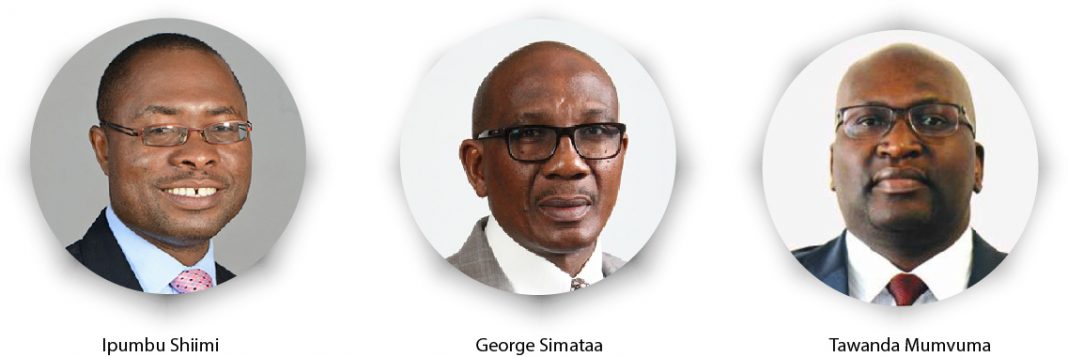By Shinovene Immanuel | 12 April 2019
BANK of Namibia governor Ipumbu Shiimi says the dismissed SME Bank executives were not fit to run a bank after they falsified documents, which is tantamount to breaking the banking law.
Shiimi’s sentiments are contained in a letter that is part of the documents submitted to the High Court in the ongoing case in which SME Bank executives are suing the central bank over their dismissal.
The executives – former chief executive Tawanda Mumvuma, finance manager Joseph Banda and manager for treasury Alec Gore – want the court to order the central bank to reverse its decision.
Others who are also suing the central bank are vice board chairperson Enock Kamushinda, board member Ozias Bvute and board chairperson George Simataa. They were removed from their positions in February this year when the central bank queried an investment of about N$200 million which the SME Bank made to two South African financial institutions.
One company which received part of the N$200 million from the SME Bank is Mamepe Capital, a South African company accused by Namibian authorities of not cooperating on the issue. The other is VBS Mutual Bank.
The interim SME Bank management has even complained to the South African Financial Services Board about Mamepe Capital’s attitude.
The Financial Services Board (FSB) is an independent body which regulates South Africa’s non-banking financial services’ industry in the public interest. In the letter to Simataa dated 6 January 2017, Shiimi said Mumvuma, Gore and Banda were not honest to SME Bank auditors BDO, as well as to the Bank of Namibia, about the investment. Shiimi made that conclusion after the three submitted information to the Bank of Namibia for a period of time about SME Bank investments, knowing that it was “inaccurate, deceiving, and constituted a misrepresentation of information to the bank.” He said the executives misinformed him that N$185 million had been invested with VBS Mutual Bank, despite “knowing [that] the money was not with this institution”. Shiimi said “the chief executive officer and financial manager broke the banking law because they made “inaccurate entries on the balance- sheet of the SME Bank, to which they both signed attestation of correctness, and submitted to the bank”. He said their continued lies rendered them “unfit to hold executive positions at the SME Bank, if no proof is provided that such an investment indeed exists in South Africa”. Shiimi’s answering affidavit further claims that Mumvuma left the country a few days before the central bank took charge of the SME Bank. “Until now, he has not returned to Namibia,” Shiimi said, adding that Banda too left Namibia suddenly on 1 March 2017. “Banda wilfully absented himself from office and Namibia,” he stated. He added that they do not know where the executives are, despite disappearing with work laptops that have important information relevant to the investigation. “It is suspected that they left Namibia to avoid answering to the ongoing investigation being conducted by the Bank (of Namibia),” he said.
According to Shiimi, when Bank of Namibia officials went to Banda’s office, they found that the core banking system at the SME Bank had been remotely shut down. Shiimi also accused Simataa of misleading the central bank by providing inaccurate information, who counter-accused the governor of making continuous “unreasonable” compliance deadlines for the SME Bank.
In his response dated 17 February 2017, Simataa told Shiimi that some of the things the central bank was asking for required third-party institutions.
Instead of addressing the concerns raised by Shiimi point by point, Simataa complained about the central bank’s tactics of not trusting the information they received from the SME Bank. “Your actions give rise to the notion and rumours that your intention has been and remains to ultimately wrestle the ownership of the SME Bank, and discredit us for reasons that are political,” Simataa said.
The fired SME Bank chairperson continued that any reasonable human being can “clearly tell a malicious and an inherent dislike that clearly shows an intent for the SME Bank to fail”. Simataa added that Shiimi was against the establishment of small banks in favour of larger ones. Simataa’s remarks are contrary to what is happening now, since the government has been lobbying state-owned entities not to withdraw their money from the troubled bank.
Shiimi also wrote a letter to industrialisation minister Immanuel Ngatjizeko, stating that the SME Bank might need an injection of N$250 to N$300 million if it failed to recover the investments in South Africa. According to sources, the SME Bank’s acting chief executive officer, Benastus Herunga, wrote to the FSB last week, complaining that Mamepe does not want to give them the latest information about where the SME Bank’s money is. Efforts to get comment from Herunga were not successful, but sources said the SME Bank asked FSB to intervene.






